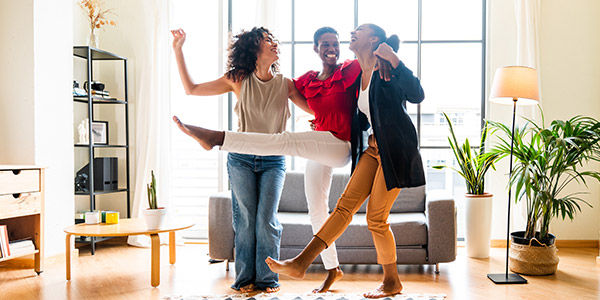Homebuyers
House Hacking to Save Money: Why Some Homebuyers Are Co-Buying a Home with Friends
September 10, 2024
For friends Weldon Hall, 47, and John Cross, 44, becoming homeowners in the Bay Area seemed out of reach. The two men, one a senior science engineer, and the other a software architect, wanted a property big enough to one day provide housing to their aging mothers. It was something they didn't think they'd be able to afford in one of the most expensive housing markets in the nation.
However, the two best friends were able to co-buy a five-unit Victorian-style home in Temescal, a neighborhood in Oakland, Calif., with help from the co-buying planning company Nestment. They each put down just $36,000 for the sale.
"Weldon is my best friend, but beyond that, I trust him to manage his part competently," said Cross. "That trust and our history made it easy. We already knew how we work together, so it felt natural to take this step."
Co-buying helps many folks to afford homeownership and build equity at a time when home prices are at record highs and mortgage rates remain elevated. Friends, family members, and investors are purchasing properties together for primary residences, vacation homes, and even rental properties.
A bonus for co-buyers is the community that it can provide.
Nearly 15% of Americans have co-purchased a home with someone other than their romantic partner, according to a report released in January by JW Surety Bonds. Another 48% said they would consider it.
How co-buying a home works
Co-buying a home together as friends follows largely the same process as the traditional homebuying process, according to New American Funding loan officer Matt Sandgren, who is based out of Dallas.
This includes steps like getting pre-approved for a loan, going through the underwriting process, touring homes, making an offer, and having that offer accepted.
Things can get more complicated depending on whether all parties will be on the loan if there are gift funds involved, and if all parties won't be living there as a primary residence.
"Greater affordability and the ability to share the responsibility of down payment funds" are some of the financial benefits of friends buying a home together, according to Sandgren.
Benefits of co-buying a home together

The main advantage of co-buying a home is that can cost each buyer a lot less.
A recent survey conducted by the J. Ronald Terwilliger Center for Housing Policy found that 74% of respondents believe that the lack of affordable homes is a significant problem in America.
Buying a home with someone else can increase affordability, especially if the co-owners are also splitting the bills. This can include the monthly mortgage payment as well as the down payment, property taxes, bills, utilities, and needed renovations.
Co-buying can have social benefits as well.
"If you do this right, you can actually do something that feels really good, that builds a lot of community and makes you both happier and more connected while also making you wealthier," said Nestment CEO Niles Lichtenstein.
Potential risks of co-buying a home
There are risks when it comes to co-buying, both financial and emotional.
Concerns about things like how maintenance and renovations will be split up, what happens if someone can't pay their portion of the mortgage or wants to sell, what to do if one buyer can't contribute as much to the down payment or has a poor credit score, and other financial questions should also be addressed before purchasing the property, according to experts.
Many co-buyers use an operating agreement or work with a real estate attorney who can help structure the deal to protect each buyer. This way if someone passes away or isn't paying their fair share, there is an ownership plan in place.
Another big concern co-buyers have is the impact of buying a home together on their relationship.
"The biggest one [risk] that people bring up is losing a friend," said Steph Douglass, CEO of Open House Austin. "But I challenge that with it could also strengthen relationships.
The best way to handle relationship concerns, including everything from cleanliness to long-term goals for the property is communication, according to Douglass.
"If you've already had all these really hard conversations about money, about equity…usually [it is] a little easier in saying, like, hey, clean your [stuff] up," said Douglass.
One of the most common fears people have of co-buying a home together is how they will resolve potential disputes, according to Nestment.
Part of planning with co-buyers is guiding them through various checkpoints to make sure they're aligned in both their goals and their abilities, said Nestment CEO Lichtenstein.
"You have to be thoughtful about when there are times where it won't work too," said Lichtenstein
For Hall, co-buying with Cross was an easier decision because they already had a history of working together.
"We've been partners in various pursuits for a while," said Hall. "We've done music together, opened up two other businesses together, you know, been around each other for a while. So, it seems very comfortable."
Should you co-buy a home?
For co-buyers Cross and Hall, whatever risks and concerns there were, it was worth the long-term benefits of owning a home.
"For me, it's just another adventure," said Hall. "I trust it will be at least good, if not great. In real estate, even 'not bad' outcomes can be very profitable, so I'm confident this will be successful."







 Smart Moves Start Here.
Smart Moves Start Here.